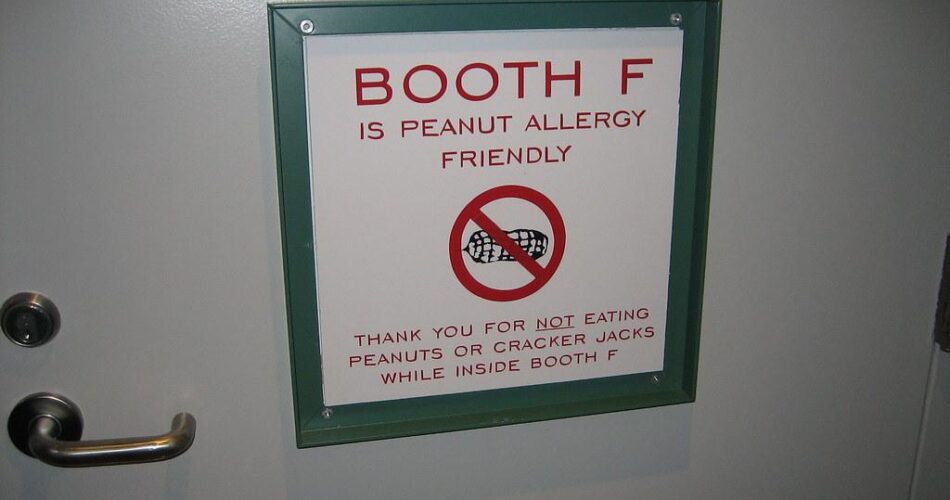For many young adults, the call to serve their country in the military is a deeply rooted and honorable desire. However, for those with peanut allergies, this dream can seem out of reach. The question of whether individuals with peanut allergies can join the military is a complex and potentially life-altering one. In this article, we will explore the guidelines and considerations surrounding this issue, shedding light on the possibilities for those navigating this unique challenge.
Understanding the Military’s Policy on Food Allergies
Having a peanut allergy does not automatically disqualify you from joining the military. However, there are certain considerations and policies in place that you need to be aware of if you have a peanut allergy.
**Here are some key points to keep in mind:**
-
- It is important to disclose any food allergies, including peanut allergies, during the enlistment process.
-
- The military will assess the severity of your allergy and determine if it can be accommodated within the military environment.
-
- Individuals with severe peanut allergies may be restricted from certain assignments or duties that involve exposure to peanuts.
In some cases, waivers may be granted for individuals with peanut allergies to serve in the military. However, this decision is made on a case-by-case basis and depends on the individual’s medical history and the specific requirements of their military job.
Implications of Having a Peanut Allergy in the Military
Having a peanut allergy can pose unique challenges for individuals looking to join the military. One of the main implications of having a peanut allergy in the military is the potential for exposure to allergens during training or deployment. This can make it difficult for individuals with severe peanut allergies to navigate various military settings where peanuts might be present.
Another implication of having a peanut allergy in the military is the need for special accommodations and medical support. Soldiers with peanut allergies may require access to emergency epinephrine auto-injectors, specialized dietary options, and close monitoring by medical personnel to prevent and manage allergic reactions. These accommodations can be vital for ensuring the safety and well-being of individuals with peanut allergies in the military.
Overall, individuals with peanut allergies who are considering joining the military should carefully weigh the potential risks and challenges associated with their allergy. While it is possible for some individuals with peanut allergies to serve in the military with proper accommodations, it is important to consider the limitations and implications of having a peanut allergy in a military context.

Accommodations and Restrictions for Soldiers with Peanut Allergies
Having a peanut allergy can present challenges for individuals considering joining the military. However, there are accommodations and restrictions in place to ensure the safety and well-being of soldiers with this allergy.
Accommodations:
-
- Soldiers with a peanut allergy may be required to carry an EpiPen at all times.
-
- Food in military dining facilities will be labeled to indicate whether or not it contains peanuts.
Restrictions:
-
- Soldiers with severe peanut allergies may be restricted from certain duty assignments or deployments.
-
- In some cases, individuals with peanut allergies may not be eligible to join certain branches of the military.

Tips for Managing a Peanut Allergy in a Military Environment
If you have a peanut allergy and are considering joining the military, there are several important tips to keep in mind to manage your condition in a military environment. One of the first things you should do is make sure to inform your superiors and medical personnel about your allergy. This will ensure that they are able to accommodate your needs and provide any necessary medical treatment in case of an emergency.
It is also crucial to always carry your epinephrine auto-injector with you at all times. This life-saving device can quickly stop a severe allergic reaction and is essential for anyone with a peanut allergy. Additionally, make sure to educate your colleagues about the seriousness of your allergy and how they can help in case of an emergency. Creating awareness can help prevent accidental exposure to peanuts.
When it comes to meal times, be sure to carefully read food labels and ask about ingredients before consuming any food. Avoiding foods that may contain peanuts is crucial in preventing an allergic reaction. If you have any doubts about the safety of a particular food item, it’s best to err on the side of caution and choose a safer alternative. By taking these precautions and staying vigilant, you can effectively manage your peanut allergy in a military environment.

Seeking Guidance and Support in the Military with a Peanut Allergy
Seeking guidance and support in the military with a peanut allergy is a valid concern for many individuals considering joining the armed forces. Having a peanut allergy can present unique challenges and safety risks in a military environment where food options may be limited and exposure to allergens is a possibility. It is important to carefully consider the implications of a peanut allergy before pursuing a military career.
One option to explore is the possibility of obtaining a medical waiver for individuals with peanut allergies. This waiver would allow for accommodations to be made to ensure the safety and well-being of the individual while serving in the military. It may involve restrictions on certain duties, training exercises, or deployment locations to minimize the risk of exposure to peanuts. Consulting with a medical professional and military recruiter can provide more insight into the process of obtaining a waiver.
In addition to seeking a medical waiver, it is essential to communicate openly and honestly with superiors, colleagues, and medical staff about your peanut allergy. Educating others about the severity of the allergy and necessary precautions can help create a supportive environment within the military. Being proactive in managing your allergy, carrying an epinephrine auto-injector at all times, and staying informed about food ingredients can also contribute to your safety and well-being while serving in the military.
Q&A
Q: Can individuals with a peanut allergy join the military?
A: Yes, individuals with a peanut allergy can join the military, but there are certain restrictions and considerations that must be taken into account.
Q: What precautions should someone with a peanut allergy take before joining the military?
A: Before enlisting, individuals with a peanut allergy should disclose their condition to military medical personnel. They may also need to provide documentation from their healthcare provider regarding their allergy.
Q: Will having a peanut allergy affect someone’s ability to perform certain military duties?
A: In some cases, individuals with a peanut allergy may be restricted from certain job roles or assignments that could potentially expose them to peanuts. However, accommodations can often be made to ensure their safety and ability to serve.
Q: Are there specific branches of the military that are more accommodating to individuals with peanut allergies?
A: Each branch of the military has its own policies and procedures regarding allergies, so it’s important for individuals with peanut allergies to research and speak with recruiters from different branches to determine the best fit for their needs.
Q: What steps should someone take if they experience a severe allergic reaction while in the military?
A: Military personnel are trained to respond to medical emergencies, including allergic reactions. Individuals with peanut allergies should carry their prescribed epinephrine auto-injector at all times and ensure that their fellow service members are aware of their allergy and how to administer the medication if needed.
Wrapping Up
In conclusion, while having a peanut allergy may pose some challenges for joining the military, with proper medical documentation and clearance from a military doctor, it is still possible to pursue a career in the armed forces. It is important to prioritize your health and safety above all else, and communicate openly with military officials about any medical conditions or restrictions you may have. Remember, with determination and preparation, you can overcome any obstacles that may stand in your way. Good luck on your military journey!





